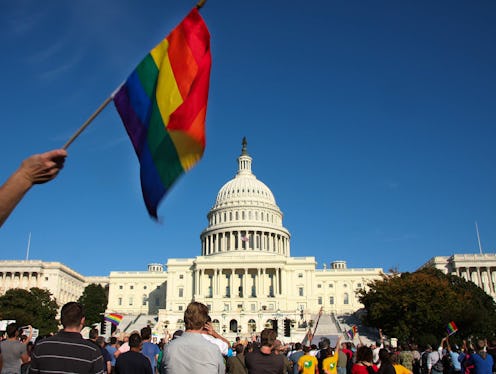Life
Conversion Therapy Is Still Legal In 32 States. A Major Organization Wants That Changed

The American Medical Association (AMA), the country’s largest professional organization for doctors, announced its support for a federal ban on conversion therapy at a conference on Nov. 19, Reuters reported. Conversion therapy — a term for the unfounded practice of trying to change a person's sexual orientation or gender identity — has been around in the U.S. for over 100 years, according to Teen Vogue. The so-called "therapy" has no basis in medicine, and is known to cause severe psychological and emotional injury, according to the Pan American Health Organization. Now, advocates for LGBTQ health are hopeful that the AMA's announcement could mean nationwide protections are soon to come.
“When the AMA moves to ban conversion therapy at a national level, what they're saying is there is no place for conversion therapy anywhere in this country,” Alexis Chavez, medical director at the Trevor Project, a nonprofit that provides resources for LGBTQ crisis and suicide prevention, tells Bustle.
For Chavez, getting support from a such large organization in the medical community is a big deal, because it shows that the conversation around the harm caused by conversion therapy is becoming more mainstream. “Any large organization, especially organizations that are health-based, tend to be potentially more traditional, slower to move on actions,” Chavez says.
The Human Rights Campaign (HRC), one of the country’s largest LGBTQ civil rights organizations, calls conversion therapy a “range of dangerous and discredited practices that falsely claim to change a person’s sexual orientation or gender identity or expression.” In a statement emailed to Bustle, HRC President Alphonso David said conversion therapy “poses a significant threat to the health and well-being” of the LGBTQ community. David said the AMA’s public support of a U.S. ban on the practice “will also be a critical resource for state legislators across the country as they work toward crafting legislation combating 'conversion therapy.'”
So far, 18 states have passed measures that protect young people from having to undergo conversion therapy, but the practice hasn’t yet been banned on a federal level. In June, House representative Ted Lieu introduced the “Therapeutic Fraud Prevention Act of 2019” in hopes of passing a ban through Congress. Sens. Patty Murray and Cory Booker also introduced a companion bill in the Senate. In her introduction of the bill, Murray said, “Conversation therapy is a sham — according to medicine and common sense — and is incredibly discriminatory and harmful towards members of the LGBTQIA+ community.”
However, some local bans have faced lawsuits from organizations that support the practice. New York City had to walk back its ban this year, after a conservative Christian organization filed a lawsuit claiming it violated free speech. According to The New York Times, city council’s move to reverse the ban was a strategic one, meant to avoid the case being taken to the Supreme Court and limiting the city’s ability to prevent conversion therapy.
The government’s slowness to move on a federal ban has serious implications for LGBTQ people, especially youth, living in the 32 states that do not offer specific protections against the practice. “When people are exposed to this idea time and time again, that they are less than a person that they have no worth, no value, it's going to make them feel more depressed, more anxious,” Chavez says of the public health risks conversion therapy poses. “They're going to turn more towards unhealthy coping strategies.
“I would like to believe that [states] are not actively considering the harmful effects that this has on people when they allow these to continue,” Chavez adds.
That risk is what the AMA is hoping to mitigate by announcing its support for a widespread ban. According to Reuters, the AMA is planning on developing model laws to guide state legislatures, and will advocate for federal policy change. The AMA is one of many medical organizations globally that has expanded on its condemnation of conversion therapy. Several organizations across the United Kingdom, including the National Health Services of England and Scotland, issued a joint memo reasserting their stance against conversion therapy in 2017. The Canadian Psychological Association also released an official stance against the practice, which other organizations in Canada have backed as well.
According to the Williams Institute at the University of California, Los Angeles, 16,000 minors aged 13 to 17 will undergo conversion therapy through a doctor before they turn 18. Another 57,000 will receive it from a religious adviser. Most minors who undergo conversion therapy do so at the request of their parents. Chavez says that young people who have survived conversion therapy are more likely to attempt suicide and face other mental health challenges.
Chavez says the steady increase in mainstream opposition of conversion therapy is what’s keeping her optimistic about eventually eradicating the practice altogether. Though she recognizes that change on a federal level will take time, Chavez says she expects lawmakers who oppose a ban on conversion therapy will change their stance when they realize the harm it causes.
“Discrimination in hindsight never looks good,” she says, “so I would encourage everyone to ensure that they're on the right side of history.”